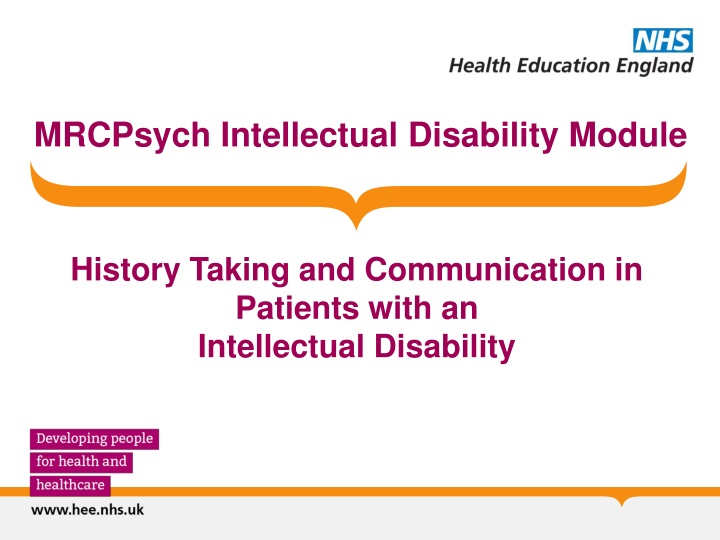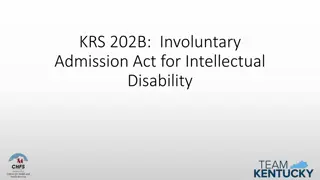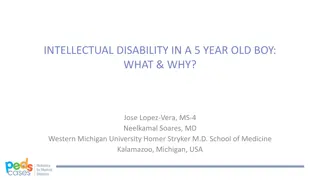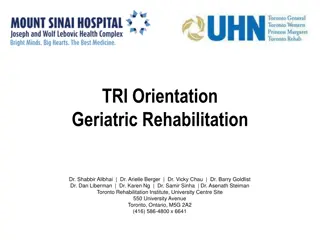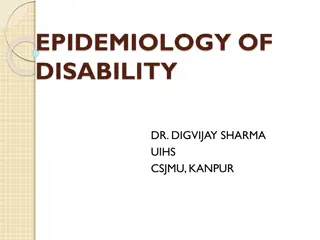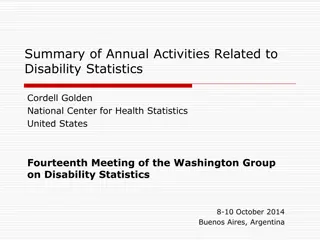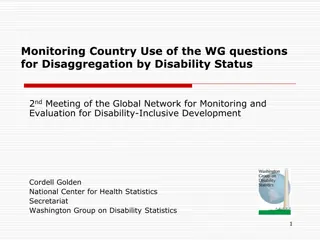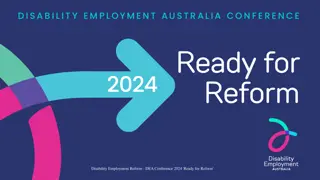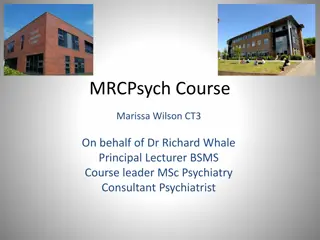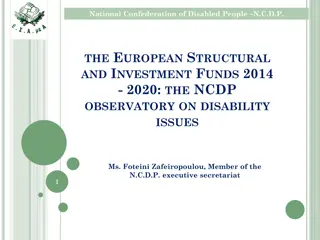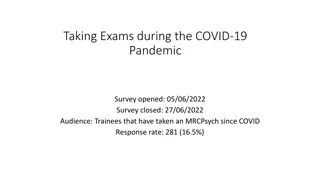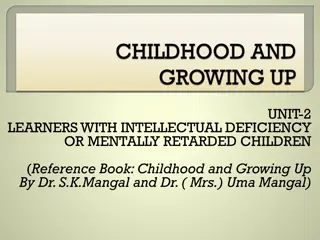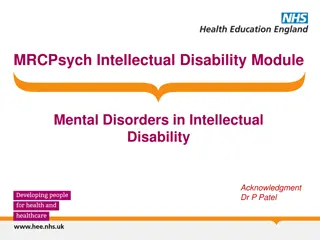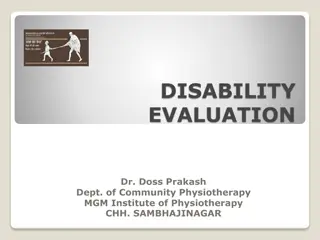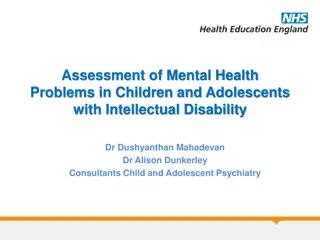MRCPsych Intellectual Disability Module
This module explores the essential aspects of history taking and effective communication in patients with an intellectual disability within a clinical setting. It provides insights and strategies for healthcare professionals to enhance their interactions and develop comprehensive care plans tailored to the unique needs of these individuals.
Download Presentation

Please find below an Image/Link to download the presentation.
The content on the website is provided AS IS for your information and personal use only. It may not be sold, licensed, or shared on other websites without obtaining consent from the author.If you encounter any issues during the download, it is possible that the publisher has removed the file from their server.
You are allowed to download the files provided on this website for personal or commercial use, subject to the condition that they are used lawfully. All files are the property of their respective owners.
The content on the website is provided AS IS for your information and personal use only. It may not be sold, licensed, or shared on other websites without obtaining consent from the author.
E N D
Presentation Transcript
MRCPsych Intellectual Disability Module History Taking and Communication in Patients with an Intellectual Disability
ID Module: History Taking and Communication in Patients with an Intellectual Disability Aims and Objectives (from handbook) The overall aim is for the trainee to gain an overview of history taking in ID By the end of the sessions, trainee should have: Awareness of the difficulties encountered in assessing patients with an intellectual disability Be able to use of other forms of communication rather than just verbal Understand the importance and role of the developmental history To have developed an understanding of how patients with an intellectual disability can present with conditions such as a mental disorder
ID Module: History Taking and Communication in Patients with an Intellectual Disability To achieve this Case Presentation Journal Club 555 Presentation Expert-Led Session MCQs Please sign the register and complete the feedback
ID Module: History Taking and Communication in Patients with an Intellectual Disability Expert Led Session Assessment, Interviewing & Gathering Information in Adults with Intellectual Disability Dr Nasim Chaudhry Consultant intellectual disability Psychiatry & Hon Lecturer University of Manchester
Hints for Psychiatric Interviewing Rules of good interviewing similar to those applicable in the general population. 1- People with intellectual disabilities more likely to say what they believe the interviewer wants to hear. 2- They have a short attention span. Therefore recap and summarise. Information from Informants: Relatives, people with whom the patient lives, care staff, other professionals involved gather as much information as you can. 5
When Interviewing Put the person at ease. Remove fears. Reassure and stress confidentiality. Try an engage by talking about familiar things. Minimise the reasons for Yes answers Ask contradictory questions. Establish an anchor event to help patients time focus. An event which fixes a period of around 4 weeks prior to the interview. 6
When Interviewing: Keep the language as simple as possible. Check whether they understand. Use the simplest possible question form. What? When? Which? Who? Why?. Leading questions are not useful. Try to use open questions. Use positive question forms. 7
When Interviewing: Probe each symptom thoroughly. A yes response to a probe is not sufficient to rate a symptom as present. Attempt to obtain a description of the symptom. Repeat questions. Assessment of communication ability is necessary at the outset. There may be discrepancy between verbal and non-verbal performance. Many people with intellectual disability are highly skilled at covering up their poor understanding and avoid being seen as incompetent. 8
History: Referral: Why and by whom. Presenting complaints: History of presenting complaints: Precipitating factors. Recent life events and changes. Symptoms: affective; cognitive and physical. Behaviour problems (ABS part II or ABC). Changes in skills and social functioning. 9
History: Past psychiatric history: Past medical history: Physical history: Vision, hearing and dental care and any mobility difficulties. Medication history: Prescribed drugs. Over-the-counter drugs. Compliance, administration and effectiveness. Side effects (Ask about common side effects, EPSE, TD) Substance and alcohol use 10
History: Forensic history: Family history: FH of : developmental disorders, physical & mental illness, epilepsy. Developmental history: Pregnancy. Birth history. Neonatal history. Early milestones. Social development 11
History: Education: Nursery. Primary schooling. Secondary schooling. Personal & social history: School leaving & transition. Further education. Employment history. Home circumstances. Past & recent life events. 12
History: Skills: Communication. Activities of daily living. Personality: Likes and dislikes. Interests. Relationships. Coping styles; reactions to stresses and illness. Services and benefits 13
Mental State Examination Many diagnostic processes rely on patients description of complicated internal phenomena, people with severe or profound intellectual disabilities will not be able to do this. Reliant on patient observation. Ask carers about any changes in behaviour, any new symptoms. Sleep, weight , level of activity. Use visual aids as pictures drawings. 14
Appearance & behaviour Motor activity: Restlessness, fidgetiness. Spasticity, gait,. Co-ordination problems. Involuntary movements. Tics. Stereotopies. Mannerisms. Posturing. Rituals. Social response at interview: Social use of language & gesture Rapport: odd, aloof. Eye contact Reciprocity: e.g. Turn taking. Empathy Social style: e.g. reserved, expansive, disinhibited, over friendly, cheeky, 15
Speech & Language: Hearing: sounds and speech. Comprehension Speech / vocalization (a) spontaneity (b) quantity e.g. mute, poverty of speech and content. (c) rate and flow (d) Stuttering (e) Complexity of sentences (f) Echoing (g) use of gestures Affect: Emotional expressiveness and range Anxiety symptoms (General, specific) Sadness, tearfulness Irritability, anger, labile 16
Thought contents: Worries, fears. Preoccupations. Hopelessness, guilt. Low self esteem. Depressive thoughts Suicidal thoughts (or behavioural equivalents) Homicidal thoughts Fantasies, wishes. Thought alienation: thought reading, broadcasting. 17
Obsessions & compulsions: Abnormal beliefs: Overvalued ideas, delusions. Ideas / delusions of reference. Delusions of control, persecution etc Abnormal experiences: Auditory, visual, somatic or other sensory Imagery and pseudo hallucinations Cognition / intelligence: Level of consciousness / alertness Test as for normal adults Consider tests for frontal / temporal lobe functioning Current IQ: Wechsler Adult Intelligence Scale hallucinations. (WAIS) 18
Insight: How does the person perceive and their mental and physical health? Valid consent: understands she/he can make a choice; is able to exercise that choice; can understand risks and benefits of proposed investigation or treatment. What helps the person to take in information (e.g. pictures, cartoons, repeated explanations, visits to EEG / CT scan dept) understand 19
Physical and Neurological Examination: Look for associated dysmorphic features. Look for common physical disorders Look for conditions associated with particular syndromes 20
Diagnostic Scales Specific semi-structured interviews may be used (e.g. Psychiatric Assessment Scale for Adults with Developmental Disabilities). Various questionnaires and semi structured interviews may be used in the diagnosis of autistic spectrum disorders, attention deficit disorders or assessment of behavioural problems. 21
Formulation / Summary Descriptive formulation ICD-10 diagnosis: Use the multi-axial classification system as per DC-LD Aetiology: Physical / Social / Psychological Investigations: (a) to confirm and describe the person s LD (b) confirm any other developmental disorder's (c) Physical / Social / Psychological investigations Interventions: Physical / Social / Psychological Legal & ethical issues (e.g. consent, Mental Health Act) 22
ID Module: History Taking and Communication in Patients with an Intellectual Disability Any Questions? Thank you . MCQs are next...
ID Module: History Taking and Communication in Patients with an Intellectual Disability MCQs 1. With regard to people with intellectual disabilities, which of the following is false: A. Diagnosis of intellectual disability is dependent on significantly sub-average IQ and associated deficits in adaptive behaviour with onset occurring before 18 years of age B. The prevalence of intellectual disability in the general population is 3% C. Mental health problems are more common than in the general population D. Mental health problems always present as challenging behaviour E. The philosophy of normalisation supports people with intellectual disabilities accessing generic health services.
ID Module: History Taking and Communication in Patients with an Intellectual Disability MCQs 1. With regard to people with intellectual disabilities, which of the following is false: A. Diagnosis of intellectual disability is dependent on significantly sub-average IQ and associated deficits in adaptive behaviour with onset occurring before 18 years of age B. The prevalence of intellectual disability in the general population is 3% C. Mental health problems are more common than in the general population D. Mental health problems always present as challenging behaviour E. The philosophy of normalisation supports people with intellectual disabilities accessing generic health services.
ID Module: History Taking and Communication in Patients with an Intellectual Disability MCQs 2. According to ICD-10, the following is not a degree of mental retardation: A. Borderline B. Moderate C. Profound D. Severe E. Mild
ID Module: History Taking and Communication in Patients with an Intellectual Disability MCQs 2. According to ICD-10, the following is not a degree of mental retardation: A. Borderline B. Moderate C. Profound D. Severe E. Mild .
ID Module: History Taking and Communication in Patients with an Intellectual Disability MCQs 3. Disruptive and dissocial behaviour occurs more commonly in which of the following category? A. Mild intellectual disability B. Moderate intellectual disability C. Severe intellectual disability D. Profound intellectual disability E. Equally common across all categories .
ID Module: History Taking and Communication in Patients with an Intellectual Disability MCQs 3. Disruptive and dissocial behaviour occurs more commonly in which of the following category? A. Mild intellectual disability B. Moderate intellectual disability C. Severe intellectual disability D. Profound intellectual disability E. Equally common across all categories .
ID Module: History Taking and Communication in Patients with an Intellectual Disability MCQs 4. The prevalence of epilepsy in the intellectual disability population is approximately: A. 1-2% B. 5-10% C. 10-15% D. 20-25% E. 50% .
ID Module: History Taking and Communication in Patients with an Intellectual Disability MCQs 4. The prevalence of epilepsy in the intellectual disability population is approximately: A. 1-2% B. 5-10% C. 10-15% D. 20-25% E. 50% .
ID Module: History Taking and Communication in Patients with an Intellectual Disability MCQs 5. The communication style that does not interfere with assessment in the intellectual disability population is: A. Denial B. Fabrication C. Engagement D. Digression E. Suggestibility .
ID Module: History Taking and Communication in Patients with an Intellectual Disability MCQs 5. The communication style that does not interfere with assessment in the intellectual disability population is: A. Denial B. Fabrication C. Engagement D. Digression E. Suggestibility .
ID Module: History Taking and Communication in Patients with an Intellectual Disability Any Questions? Thank you.
